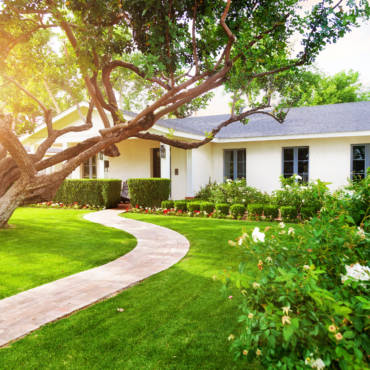Trees- Are They Affecting Your Property Value?

Did you know that the trees in your yard could actually have an effect on your property value? It’s not just the fancy interiors and neighborhood extras that factor into an appraisal. But how do you know if your trees are adding value or if you should be scheduling removal? Whether you’re a home owner, buyer, or seller, we’ve provided you with some tips on how to detect if your trees are an asset or something to get rid of.
Is it an Old Tree?
Big trees are usually old trees. Therefore, they often have wandering roots that may go beyond the human eye. Tree roots search for water and nutrients, and in turn they expand and grow – which may cause problems throughout the surrounding property. Tree roots on average can extend up to two to three times farther than the tree’s foliage, also known as the tree’s crown. This can cause an array of problems if the root emerges through the ground or grows into structures, pavement, pipes, or utility service lines. So, it’s a good idea to get to know your trees and how long they’ve been there. Inspect the area surrounding the tree for these warning signs. If your old tree is in healthy condition and poses no risks, it is likely no risk, and possibly a boon, to your property value.
Are you Prepared for a Mess?
The healthiest of trees will often times result in a mess in your yard. Are you prepared for the task and the associated cost of the tools needed? Whether you are raking or leaf blowing, this type of maintenance takes time and or money to pay someone to do it – so be aware about the kinds of trees you have in your yard and what kinds of debris they shed throughout the year. Remember that when big storms roll in, branches big and small will be falling in the yard and require cleanup. Speaking of branches, trees that hang over driveways pose a big risk as well. Consider the scenario of dead or even healthy branches falling and blocking the driveway, falling on people, cars, or the garage. For many homeowners, this may not be a dealbreaker – but it is still something to prepare for.
Are all Trees the Same?
There is not actually one specific tree species that is proven to increase property value. The more important factors concern the overall quality of the tree – is it disease resistant? Is it suited for your planting zone? Planting zones are an indication of your average minimum temperature and will help you determine what species of trees will survive and flourish in your area. You can also speak to a local arborist about choosing the right trees for your property if you’re interested in planting new ones and are unsure.
What Are Good Tree Qualities?
Trees are essential to our collective effort for a more sustainable environment. Big, hearty, and healthy trees provide warming effects of the sun in the winter, maximize shade during the summer, and deflect heavy winds. Signs of a good tree that will add property value will come down to the appropriateness of the tree species for the area, the location of the tree in proximity of your home, and the tree’s overall condition. When looking at the overall condition of your tree, check for growth each year by measuring the trunk and inspecting its branches to compare this year’s bloom to last years. With the exception of some trees, the bark of your tree should not be coming loose or peeling. The bark should also be free of moss or fungi as well. Check for proper leaf color, shape, and size to ensure it is growing properly and staying healthy. Even healthy trees need to be trimmed and pruned, so make sure to also keep up with this type of maintenance every year to ensure your tree is at its best health.




